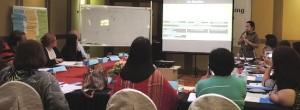
On March 8, 2017 the Regional Development Council XI of Davao, Philippines approved and signed two resolutions that will spur the local implementation of President Duterte’s Executive Order (EO) No. 12 that mandates “Zero Unmet Need for Modern Family Planning by 2018.”
- Resolution No. 19 “enjoins Davao Region’s local government units to provide annual increase in the health budget for family planning-maternal child health and nutrition programs.”
- Resolution No. 20 “requests the Regional Implementation Team for the Responsible Parenthood and Reproductive Health Law and EO No. 12 to issue policy directives for the operationalization of their reproductive health-related mandates.”
The Philippines’ government system is devolved, meaning that local government leaders can decide to adopt and implement executive orders holistically or partially based on their local context. The new resolutions for the Davao region in Mindanao island reflect the ownership and commitment of the five provincial governors and Davao City mayor to localize and implement EO No.12 within their jurisdiction, thereby enhancing women's access to quality family planning and reproductive health services.
Advance Family Planning local partner Jhpiego-Philippines led the formulation and dissemination of the resolutions to local government executives and key government partners, in close collaboration with the Department of Health Regional Office XI and National Economic and Development Authority. The newly-formed advocacy subcommittee of EO No. 12’s Regional Implementation Team presented the resolutions to members of the Social Development Council, and worked to obtain Regional Development Council approval. At the provincial levels, Jhpiego organized key partners and crafted advocacy messaging for the five decision-makers.
The resolution implementation (legalized on April 6, 2017) is timely, as local government agencies prepare their 2018 fiscal year plans and budgets for submission to the National Department of Budget and Management in August 2017, for approval by October.
Typically resolutions such as No. 19 that include budget increases are challenged, however the provincial government leaders agreed to adopt and implement the resolutions at their level. Policy groups are currently discussing drafting provincial-level orders. Approval of provincial policy adoption is expected on May 31, 2017.
The Philippines includes several levels of government units: provincial, municipal/city, and barangay (village)—all of which have a percentage share in the utilization of national wealth. Provincial leaders already noted that they will advocate for the municipal leaders to further adopt the resolutions using their budget share.
Jhpiego Philippines plans to replicate the advocacy process in another region, which has been endorsed by the Assistant Secretary of the Mindanao Health Cluster and the Concurrent Regional Director of Department of Health Regional Office XI.
Since this advocacy win, President Duterte declared martial law in the island of Mindanao (of which Davao region is a part) on May 23, 2017 to mitigate clashes with militants. Local government at various levels implemented guidelines in accordance to the declaration. Fortunately, this has had an insignificant effect for Jhpiego Philippines’ AFP advocacy in Davao—Marawi City, which has been at the center of clashes, is almost 390 km away from Davao by land. Their advocacy focus remains on local governments decision-makers who preside safely at the center of business in Davao.

